江苏省兴化市昭阳湖初级中学七年级英语上册 Unit 4 My day Reading 2论文2 (新版)牛津版
- 格式:doc
- 大小:75.50 KB
- 文档页数:5
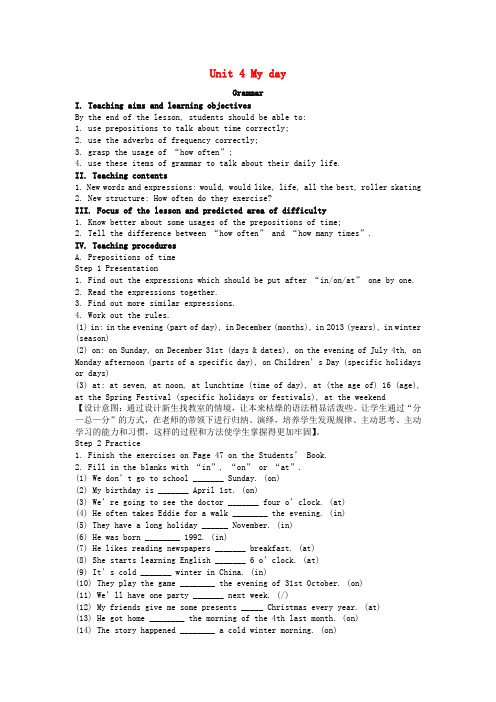
Unit 4 My dayGrammarI. Teaching aims and learning objectivesBy the end of the lesson, students should be able to:1. use prepositions to talk about time correctly;2. use the adverbs of frequency correctly;3. grasp the usage of “how often”;4. use these items of grammar to talk about their daily life.II. Teaching contents1. New words and expressions: would, would like, life, all the best, roller skating2. New structure: How often do they exercise?III. Focus of the lesson and predicted area of difficulty1. Know better about some usages of the prepositions of time;2. Tell the difference between “how often” and “how many times”.IV. Teaching proceduresA. Prepositions of timeStep 1 Presentation1. Find out the expressions which should be put after “in/on/at” one by one.2. Read the expressions together.3. Find out more similar expressions.4. Work out the rules.(1) in: in the evening (part of day), in December (months), in 2013 (years), in winter (season)(2) on: on Sunday, on December 31st (days & dates), on the evening of July 4th, on Monday afternoon (parts of a specific day), on Children’s Day (specific holidays or days)(3) at: at seven, at noon, at lunchtime (time of day), at (the age of) 16 (age), at the Spring Festival (specific holidays or festivals), at the weekend【设计意图:通过设计新生找教室的情境,让本来枯燥的语法稍显活泼些。
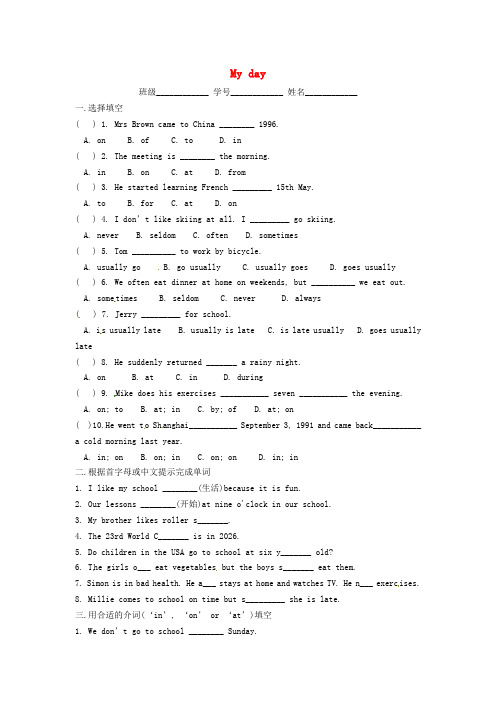
My day班级____________ 学号____________ 姓名____________一.选择填空( ) 1. Mrs Brown came to China ________ 1996.A. onB. ofC. toD. in( ) 2. The meeting is ________ the morning.A. inB. onC. atD. from( ) 3. He started learning French _________ 15th May.A. toB. forC. atD. on( ) 4. I don’t like skiing at all. I _________ go skiing.A. neverB. seldomC. oftenD. sometimes( ) 5. Tom __________ to work by bicycle.A. usually goB. go usuallyC. usually goesD. goes usually( ) 6. We often eat dinner at home on weekends, but __________ we eat out. A. some times B. seldom C. never D. always( ) 7. Jerry _________ for school.A. i s usually lateB. usually is lateC. is late usuallyD. goes usually late( ) 8. He suddenly returned _______ a rainy night.A. onB. atC. inD. during( ) 9. Mike does his exercises ___________ seven ___________ the evening.A. on; toB. at; inC. by; ofD. at; on( )10.He went t o Sh anghai___________ September 3, 1991 and came back___________ a cold morning last year.A. in; onB. on; inC. on; onD. in; in二.根据首字母或中文提示完成单词1. I like my school ________(生活)because it is fun.2. Our lessons ________(开始)at nine o'clock in our school.3. My brother likes roller s_______.4. The 23rd World C_______ is in 2026.5. Do children in the USA go to school at six y_______ old?6. T he girls o___ eat vegetables but the boys s_______ eat them.7. Simon is in bad health. He a___ stays at home and watches TV. He n___ exerc ises.8. Millie comes to school on time but s_________ she is late.三.用合适的介词(‘in’, ‘on’ or ‘at’)填空1. We don’t go to school ________ Sunday.2. My birthday is _______ April 1st.3. We always have a good time _______ May Day.4. He often takes Eddie for a walk _______ the evening.5. They have a long holiday ________ November.6. People are very happy ________ Christmas.7. She starts learning English _________ six o’clock.8. It’s cold _______ winter in China.9. They play the game ________ the evening of 31st October.10. He likes reading newspapers _________ breakfast.四.对划线部分提问1. He walks to home once a week._____________________________________________________2. They sometimes play football._____________________________________________________3. He seldom takes a taxi to go to school._____________________________________________________4. We play badminton for half an hour every day._____________________________________________________5. Eddie walks to his bowl many times a day._____________________________________________________五.翻译下列句子1.他上学从不迟到。
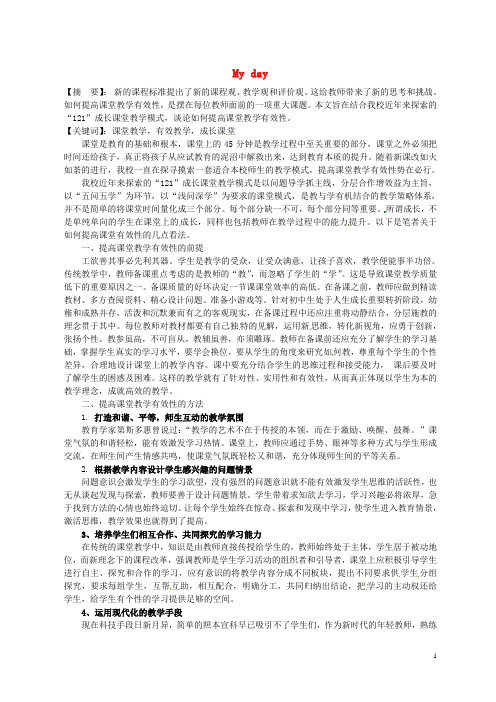
My day【摘要】:新的课程标准提出了新的课程观、教学观和评价观。
这给教师带来了新的思考和挑战。
如何提高课堂教学有效性,是摆在每位教师面前的一项重大课题。
本文旨在结合我校近年来探索的“121”成长课堂教学模式,谈论如何提高课堂教学有效性。
【关键词】:课堂教学,有效教学,成长课堂课堂是教育的基础和根本,课堂上的45分钟是教学过程中至关重要的部分,课堂之外必须把时间还给孩子,真正将孩子从应试教育的泥沼中解救出来,达到教育本质的提升。
随着新课改如火如荼的进行,我校一直在探寻摸索一套适合本校师生的教学模式,提高课堂教学有效性势在必行。
我校近年来探索的“121”成长课堂教学模式是以问题导学抓主线,分层合作增效益为主旨,以“五问五学”为环节,以“浅问深学”为要求的课堂模式,是教与学有机结合的教学策略体系,并不是简单的将课堂时间量化成三个部分。
每个部分缺一不可,每个部分同等重要。
所谓成长,不是单纯单向的学生在课堂上的成长,同样也包括教师在教学过程中的能力提升。
以下是笔者关于如何提高课堂有效性的几点看法。
一、提高课堂教学有效性的前提工欲善其事必先利其器。
学生是教学的受众,让受众满意,让孩子喜欢,教学便能事半功倍。
传统教学中,教师备课重点考虑的是教师的“教”,而忽略了学生的“学”。
这是导致课堂教学质量低下的重要原因之一。
备课质量的好坏决定一节课课堂效率的高低。
在备课之前,教师应做到精读教材、多方查阅资料、精心设计问题、准备小游戏等。
针对初中生处于人生成长重要转折阶段,幼稚和成熟并存,活泼和沉默兼而有之的客观现实,在备课过程中还应注重将动静结合,分层施教的理念贯于其中。
每位教师对教材都要有自己独特的见解,运用新思维,转化新视角,应勇于创新,张扬个性。
教参虽高,不可盲从,教辅虽善,亦须雕琢。
教师在备课前还应充分了解学生的学习基础,掌握学生真实的学习水平,要学会换位,要从学生的角度来研究如何教,尊重每个学生的个性差异,合理地设计课堂上的教学内容。
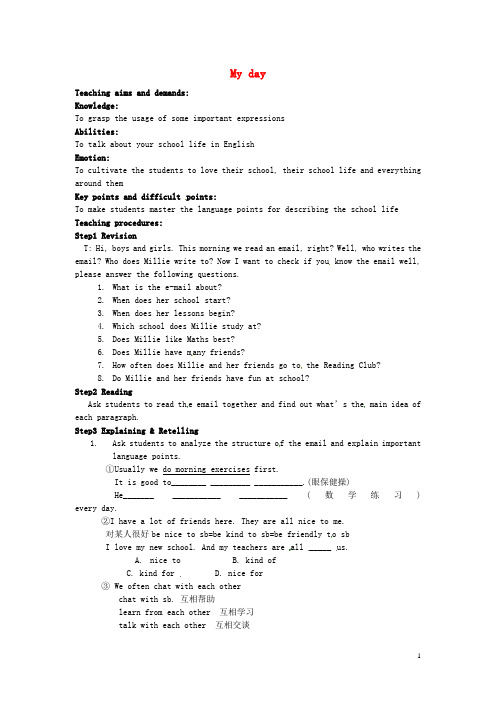
My dayTeaching aims and demands:Knowledge:To grasp the usage of some important expressionsAbilities:To talk about your school life in EnglishEmotion:To cultivate the students to love their school, their school life and everythingaround themKey points and difficult points:To make students master the language points for describing the school lifeTeaching procedures:Step1 RevisionT: Hi, boys and girls. This morning we read an email, right? Well, who writes theemail? Who does Millie write to? Now I want to check if you know the email well,please answer the following questions.1.What is the e-mail about?2.When does her school start?3.When does her lessons begin?4.Which school does Millie study at?5.Does Millie like Maths best?6.Does Millie have m any friends?7.How often does Millie and her friends go to the Reading Club?8.Do Millie and her friends have fun at school?Step2 ReadingAsk students to read th e email together and find out what’s the main idea ofeach paragraph.Step3 Explaining & Retelling1.Ask students to analyze the structure o f the email and explain importantlanguage points.①Usually we do morning exercises first.It is good to________ _________ ___________.(眼保健操)He_______ ___________ ___________ (数学练习) every day.②I have a lot of friends here. They are all nice to me.对某人很好be nice to sb=be kind to sb=be friendly t o sbI love my new school. And my teachers are all _____ us.A.nice toB. kind ofC. kind forD. nice for③ We often chat with each otherchat with sb. 互相帮助learn from each other 互相学习talk with each other 互相交谈④We practise after school on Wednesday afterno onpractise sth 练习某事practise doing sth 练习做某事We should practise __________(speak) English in class.It takes her half an hour _________ (practise) _________(swim) in the swimming pool.A. practise; swimB. to practise; to swimC. to practise; swimmingD. practises;swims⑤6.have a good time 玩得开心= have fun= enjoy oneselfWe hope you can have fun at the party,Amy. (改同义句)We hope you can ___ __ ___ ___ at the party,Amy.We hope you can _____ _____ at the party,Amy.2.Let students retell the email according to the chart.Step4 WritingAsk students to write about their day by using the important sentence patterns and phrases we learnt just now.Step5 Doing exercisesMake students complete the following exercises.1.To read a passage and fill in the blanks2.To fill in the blanks with the words in correct forms.3.To choose the best answers.Step6 Home work1. Try to remember the useful phrases.2. Try to write an e-mail about your own school life and send it to your oldclassmates.。
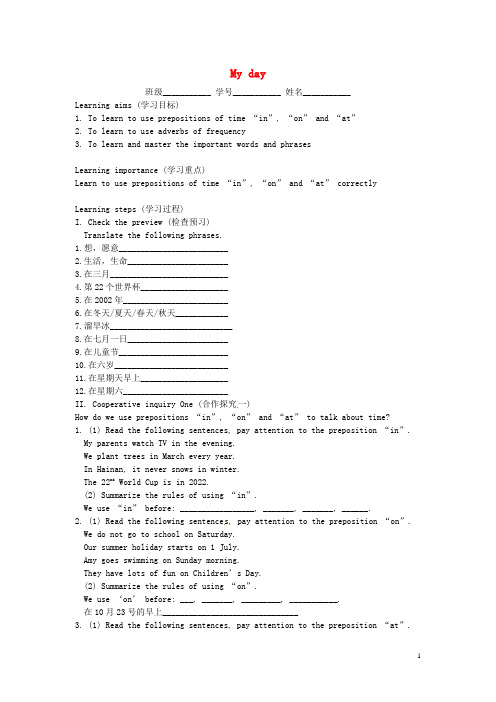
My day班级___________ 学号___________ 姓名___________Learning aims (学习目标)1. To learn to use prepositions of time “in”, “on” and “at”2. To learn to use adverbs of frequency3. To learn and master the important words and phrasesLearning importance (学习重点)Learn to use prepositions of time “in”, “on” and “at” correctlyLearning steps (学习过程)I. Check the preview (检查预习)Translate the following phrases.1.想,愿意_________________________2.生活,生命_______________________3.在三月___________________________4.第22个世界杯____________________5.在2002年________________________6.在冬天/夏天/春天/秋天____________7.溜旱冰____________________________8.在七月一日_______________________9.在儿童节_________________________10.在六岁__________________________11.在星期天早上____________________12.在星期六________________________II. Cooperative inquiry One (合作探究一)How do we use prepositions “in”, “on” and “at” to talk about time?1. (1) Read the following sentences, pay attention to the preposition “in”. My parents watch TV in the evening.We plant trees in March every year.In Hainan, it never snows in winter.The 22nd World Cup is in 2022.(2) Summarize the rules of using “in”.We use “in” before: _________________, _______, _______, ______.2. (1) Read the following sentences, pay attention to the preposit ion “on”. We do not go to school on Saturday.Our summer holiday starts on 1 July.Amy goes swimming on Sunday morning.They have lots of fun on Children’s Day.(2) Summarize the rules of using “on”.We use ‘on’ before: ___, _______, _________, ___________.在10月23号的早上_______________________________3. (1) Read the following sentences, pay attention to the preposition “at”.Millie has breakfast at seven o’clock.At lunchtime, he always chat with his friends.They will go to England for a holiday at Christmas.Children in China start school at 6 years old.(2) Summarize the rules of using “at”.We use ‘at’ before: ______, _______, ________________, _____.at noon ________________at night ________________III. Cooperative inquiry Two (合作探究二)How do we use adverbs of frequency?1. Read Part B and write the following adverbs in correct order._________>_________>_________>_________>_________>________(always, usually, often, sometimes, seldom, never)2. The position about adverbs of frequency.(1)频率副词用在be动词后。
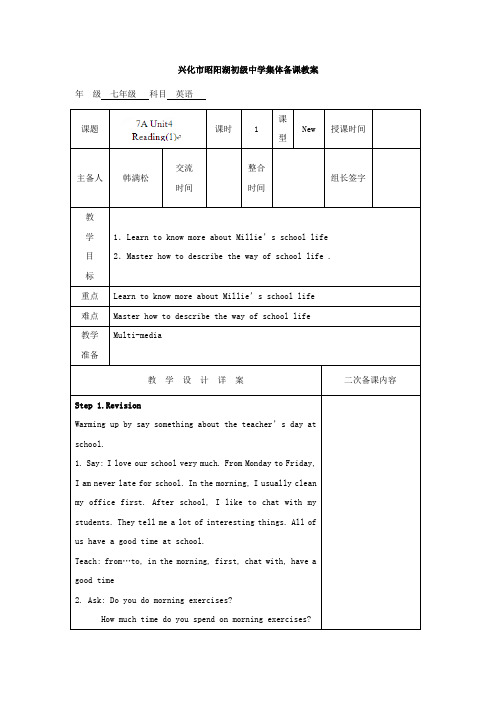
兴化市昭阳湖初级中学集体备课教案年级七年级科目英语课题课时 1课型New 授课时间主备人韩满松交流时间整合时间组长签字教学目标1.Learn to know more about Millie’s school life 2.Master how to describe the way of school life .重点Learn to know more about Millie’s school life难点Master how to describe the way of school life教学准备Multi-media教学设计详案二次备课内容Step 1.RevisionWarming up by say something about the teacher’s day atschool.1. Say: I love our school very much. From Monday to Friday,I am never late for school. In the morning, I usually cleanmy office first. After school, I like to chat with mystudents. They tell me a lot of interesting things. All ofus have a good time at school.Teach: from…to, in the morning, first, chat with, have agood time2. Ask: Do you do morning exercises?How much time do you spend on morning exercises?Say: Tommy wants to know what Millie and her classmates do on a school day. Help him match each activity with the correct time.Step 4 PracticeRead and answer questions1. Read Millie’s email after the tape.2. Do Part B2, tell T or F.3. Ask and answer questions in pairs :(1). On what days does Millie go to school in a week?(2). When does their school start?(3). What do they do first at school?(4). What lesson does Millie like?(5). When do Millie and her friends play in the playground?(6). Where does Millie sometimes go in the afternoon?(7). When does Millie practice volleyball?Step 5 ConsolidationWhat have you learned in this class? Do you have any questions to ask?作业设计教学反思。
My day【课时导航】一.根据汉语写出英语词组。
1.在操场上2.从……到…...3.打网球4.你最喜欢的活动5.在星期天下午6.擅长于7.相互聊天 8.玩得愉快______________________二根据首字母填空1. It’s time to g__________up, Eddie.2. Every day, we do morning e____________ first at school.3. The students should help e____________ other.4. You shou ld p__________ more if you want to speak English well.5. My f ____________ subject is English.【拓展延伸】一.句型转换。
1. I am not good at sports.(同义句)_____________________________________________2. I do my homew ork every day. (改为否定句)_____________________________________________3 Lily often gets up at 6.30 eve ry day. (对划线提问)_____________________________________________4. She swims very well. (改为同义句)______________________________________________二.根据所给汉语完成句子。
1.我是阳光中学的一名学生。
I am a __________ at _________ _________ _________.2. 我们学校的一天从八点开始。
Our ________ ___________8:00 every day.3. 我们经常周二和周四在图书馆读书。
My day一学习目标1.进一步了解的在校生活2.掌握描述校园生活的方式3.运用已学知识,描述自己的校园生活二学习重点及难点掌握下列生词:first, each, other,practise,wish掌握下列短语:each other, have a good time, be nice to sb课前复习What is the e-mail about?Which school does Millie study at?When does her school start?When does her lessons begin?Does Millie like Maths best?Does Millie have many friends?How often does Millie and her friends go to the Reading Club?Do Millie and her friends have fun at school?课堂训练任务型阅读My name is Jim. I’m 14 years old, and I study in No. 1 Middle School of Huai'an. My school is very big and beautiful. I'm very happy in the school.I usually get up at 6:15 in the morning. Then I do morning exercises in the p layground. At 6:40, I have my breakfast. You can see many students and teachers in the dinning room. After breakfast, I often read English with my cl assmates.We have six classes every day. The first class begins at 7:50 am. I like all the classes, because my teachers can make the classes lively and interesting. My favorite subject is English, so I go to the English Club every week. I can speak English with many other students there. It's very interesting and exciting. I think it's helpful for me to learn English well. After class, I always play games with my friends. We play basketball, volleyball, ping-pong and so on. They are very relaxing.I like my lessons, my friends and my teachers. In a word, I love my school. My school li fe is wonderful, isn't it?school I study in No.1 Middleschool.My school is ___1___ and ____2____.I ___3____ ____4___ in the school.activities Get up at 6:15 in the morning.Then I do moring ___5____ in the playground.At 6:40, I have my breakfast.After breakfast, I often read English.lessons The classes are___6___ and ___7_____.I like _____8_______ best.Playing ball games are very____9_______.School life My school life is ___10_____.课后巩固一.词汇。
My day【摘要】:英语教学的重点是对学生听、说、读、写四项基本技能的培养,而初中阶段的听力培养是整个中学英语教学的基础和关键,听是理解和吸收口头信息的交际能力,提高听力不仅有利其他三项技能的发展,而且会为日常交际活动打下了坚实的基础。
尽管听力训练现在渐渐成为中学乃至小学的英语教学内容,但目前初中英语的听力教学还处于起点阶段,距新课标所规定的目标尚有一定的距离,如何提高中学生的听力是英语教学中的不可忽视的问题。
“121”成长课堂的高效性就是通过“121”课堂模式使得教育教学效率或效果能够有相当高的目标达成,具体而言是指完成教学任务和达成教学目标的效率较高、效果较好并且取得教育教学的较高影响力和社会效益的课堂。
总之,听力能力的提高是一个相当复杂的过程,英语教师应在摸清并排除造成听力困难因素的基础上,扎扎实实地利用初中三年的课内外时间,采用一些有效的办法来提高学生的英语听力,并经过长期不懈的努力和训练,才能产生令人满意的效果。
【关键词】:听力困难;主体作用;听力教学策略一、学生听力困难的原因(一)听力能力的缺乏听力是听和理解能力的总和。
听力理解过程是人们运用各种知识和技能的过程。
我们可以将学生拥有良好的语音基础、充足的词汇量及相应的语法看成是学生较好理解英语的一种能力。
学生如果缺乏这种能力,自然而然就会造成听力困难,也就不可能正确地理解听力材料。
而往往在对学生进行听力训练时,要求不仅是要辨音,同时也要对连贯语流进行同步准确解意,这就充分体现了语音、词汇、语法三者相结合的重要性,也就强调了学生听力能力的重要。
但是受传统的英语教学影响,在初中教学阶段,教师普遍比较重视写,忽视学生听说能力的培养,进而也就导致了学生只会认读,即所谓“哑巴英语”,不注意语音、词汇、语法三者的密切联系,这样就会影响学生英语综合能力的提高。
(二)听力心理的障碍听力理解过程也是一项较复杂的心理活动过程。
由于听力理解既要求学生熟练地掌握必要的词汇和语法知识,又要在听的过程中敏锐地辨析语音的变化和语调的含义,并对所听材料进行再加工处理,因此在听力训练中大部分学生会产生心理障碍,其主要表现在听音时过于紧张或注意力不集中两个方面。
另外,由于不良的听力习惯,一些学生在听的过程中总是力图希望把每个词每个句都听懂,但是能力有限,当连贯的句子中出现学生本身无法理解或陌生的词句,学生的理解速度就会大大慢于听力材料的录音速度,于是越听越急躁,越听越紧张,好的心态就无法保持,情绪也无法稳定,如此恶性循环,结果可想而知。
(三)母语阅读的干扰听力主要目的就是弄懂所听材料的基本思想。
受长期的母语学习的影响,学生在做听力时,总是习惯用逐字逐句将英文翻译出中文来理解,而不是直接将语言信息转化成一个情境,从而在情境中理解材料所要表达的内容,这样就会形成听力上的时间差,做不到听音会意,也就造成了听力理解的错误。
母语学习的固有方式的干扰使得学生在进行听力训练时不能很好地进行思维,反应速度、理解程度和记忆效果远不如学习母语时的程度,又由于学生忽视课本内容的阅读,平时训练时也缺乏课外的阅读,自己的知识面窄,阅读无技巧,学生自然就不会想到通过寻找听力材料上下文之间的逻辑关系来进行正确地猜测,纵使进行再多的听力训练,阅读能力无法提高,听力训练的真正的目的也就无法达到。
(四)文化知识的差异英语听力材料内容广泛,涉及到英语国家的文化背景、历史知识、风土人情、宗教信仰、社交礼仪等方面的知识。
学生在进行听力训练时,所听到的大部分内容也无非就是关于西方国家人们的日常生活中发生的事情,但由于外部环境的不同,学生不可能每天都会接触到这些文化背景知识,于是当听到有关天文、地理、历史、社交礼仪、文化习俗等内容时,学生甚至会以自己为材料主体,用中国的文化背景来进行“想当然”的猜测,这样又怎么会听好听力呢?如:A:Hello, you look tired today.B:Yes, I went to bed too late last night.中国学生往往会说“Y ou had better go to bed earlier tonight if you can.”这样关心的建议在中国比较普遍,但根据英语习惯,A只须说“I do hope you will be felling better soon.”或“T ake good care of yourself.”这类肤浅的说法表示关心。
反之,对方会觉得你太干涉他人的私生活了。
(五)教学效率的低下现今,中学英语教学仍不同程度地存在着高耗低效的现象,教学中充斥着大量“科学”而“无效”、“正确”而“无用”的教学内容和教学方法。
一些教师将大量的时间浪费在无效无用的知识的重复学习上,过分注重对语言知识的系统讲解,过分强调记忆的功能和机械的训练,而忽视了对学生语言运用能力、提取信息和处理信息能力以及分析问题、解决问题能力的培养,另外,对学生的情感需求和自主学习能力的培养关注当然也不够,单一、满堂灌的教学方法和被动的学习方式难以全面提高学生英语学习的综合能力。
二、“121”成长课堂有利于发挥学生的主体作用英语作为一门语言实践课,其需要达到的语言技能是要靠学生个人的积极参与和反复实践才能达到的。
教师要把学生看成能动的主体,促进学生在整个教学过程中主动参与、全员参与,最大限度地发挥学生的自主性、能动性和创造性。
那么,如何充分发挥学生作为主体的作用呢?(一)以人为本,能动教学“121”成长课堂下教师在教学过程中应当始终坚持以人为本的科学理念,充分发挥学生作为教学主体的积极作用。
学生应是教学活动的中心,任何教学活动的出发点都是为了使得主体的积极作用得到充分体现,教师、教材、教学手段都应该服务于学生的“学”。
教师应引导学生积极参与到教学实践中去,充当教学活动的主角,充分发挥主人翁的精神。
因此,调动学生的学习主动性,并明确学生自身的主体作用已成为教师的一项重要课题。
(二)活学活用,以我为主“121”成长课堂下学生作为学习的承担者,保障了其主体地位。
教师要让学生明确两点,一方面,学生要做到增强自我激励学习动力、加强自我调动学习的主动性、明确英语学习目的与生活目标的联系、提高自我创新能力和学习能力;另一方面,学生自身则要采用各种途径不断夯实基础,培养听、说、读、写技能,更要通过自己的不断地实践学习找到适合自己英语学习的一套方法,总结出学习英语的规律特点和方法,只有这样才能充分保证学生的主体地位,发挥学生的主体的积极作用,才能提高学生的自觉性、创造性,也才能使学生高效学习,事半功倍。
三、“121”成长课堂有利于优化听力教学的策略“121”成长课堂的教学策略遵循一切从实际出发,实事求是的原则,更要坚持一视同仁,因材施教的教学要求,还要不断地改进,不停地创新,做到与时俱进,发明出一套有利于学生学习成长的教学策略。
(一)“121”成长课堂会夯实学生基本,拓展知识视野语音、词汇、语法是语言的三个基本要素,是英语学习的基础。
要想提高听力水平,必须从语音基础抓起,这需要长时间的训练和积累。
良好的听音技能是做好听力测试的基础,宽阔的知识面是获得高分的条件。
词汇量是听力的一大障碍。
因为在听音时,大脑是来不及对生词做出反应的,即使学生能够利用上下文来猜测,但这样会分散注意力,影响对整句意义的理解。
所以,在平时学习的过程中,学生应该在词汇量的积累方面苦下功夫,并且注重积累各方面的常识和各学科的基本知识。
只有这样,才能实质性提高听力能力。
(二)“121”成长课堂能激发学习兴趣,促使主动参与兴趣是学好语言的关键,激发学生学习英语的兴趣是中学阶段英语教学的一项重要任务。
教师可在教学中创造良好的英语学习环境,在课堂上,教师可采用抢答的方式,激发学生听的兴趣,刺激学生的大脑反应,活跃课堂气氛;在课外,教师开展各种各样的英语兴趣小组活动来引起学生的注意力和提高学生的能力,以此来提高英语听力。
只有在融洽快乐的学习氛围中,学生的心理状态才会最调整到最佳,也才会主动参与其中。
(三)“121”成长课堂会渗透各个环节,优化听力训练教师要将听力训练渗透课堂的每个环节,在每个环节中都应尽量使用英语,尽可能让学生多听英语,培养听的习惯。
在日常的英语教学中,更要加大录音磁带的使用量,采用预听、跟读等形式,将听力训练渗透于每堂课,而对于听力训练材料的选择则要由浅入深,由简到繁,使学生有一个过渡的循序渐进的学习过程,听力材料更要形式多样、生动活泼,让学生对听力材料感兴趣,才会对听力产生动力。
(四)“121”成长课堂会变化训练方式,提高实际效果在听力训练时,要力求做到精听与泛听,集中训练与分散训练二者相结合。
课上精听,课下泛听,精听抓“质”,泛听抓“量”。
另外,需定时抽出一定时间集中进行听力训练,做到“常”听但不“长”听,集中也要分散,二者在不同时期有所侧重,在适当时期有效结合,学生听力水平就会大大提高,也才会达到预期的效果。
(五)“121”成长课堂会导入文化教学,积累文化知识1. 在对话教学中引入文化教学。
JEFC (Junior English for China )和SEFC(Senior English for China)教材中每个单元的对话课都有不同功能的语言训练项目,教师应充分利用这些内容来训练学生得体地使用语言,使学生了解话语会受文化的影响。
例如,选择话题时,不同的话题,如谈论天气、问候健康、表示关心、询问年龄、收入、个人隐私、表达谢意、歉意、谦虚、祝福等等,在不同的文化中有不同的社会含义。
多让学生在课堂上用英语交流,给出特定情景,让学生编对话,让学生逐步获得语言和文化方面的敏感。
2. 阅读教学是学生最大量接触文化内容的方式。
阅读前,教师可以以“文化旁白”的方法来介绍阅读材料的文化背景知识;阅读中,发掘阅读材料中的文化内容,讲解文化内涵;阅读后,组织学生就文化内容进行讨论、对比等。
3.在写作教学中,引导学生体会,由于中英语思维方式的差异而导致在同类语篇的不同结构、对同一事物的表达在逻辑思维方式上存在的差异等。
教师在教写作时若能充分意识到这种差异,而不是单纯地从语言知识和写作技巧上训练学生,就能在教学策略上更有针对性,效果会更佳。
学生也更能体会到什么是地道的、流畅的、连贯的英语文章。
4.在进行语言知识教学时,把英美国家的文化对英语词汇、语法的影响融入到教学之中。
教师可以有意识地总结一些具有文化内涵的词汇和习语,如关于动物、颜色等词汇在中英文化中含义的相同点和不同点,a green hand(生手)、green with envy(充满妒嫉)、a black sheep(败家子)、 in the black(不欠债)、 gray mare(母老虎)、a busy bee(忙碌的人)等等。